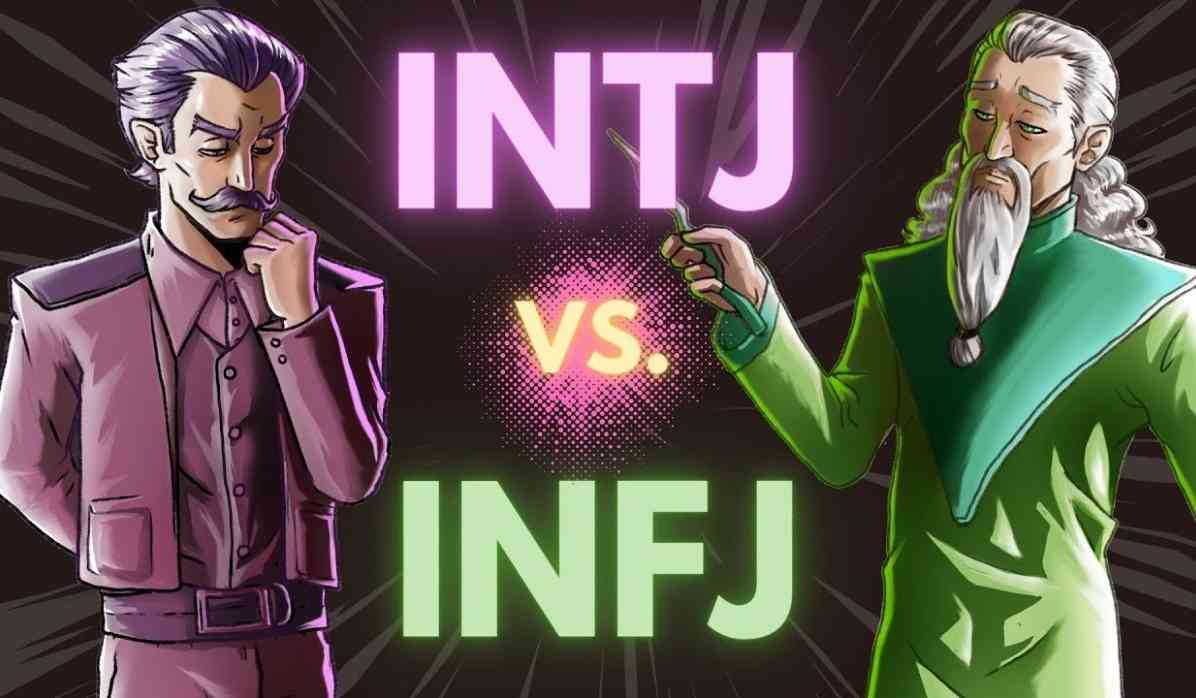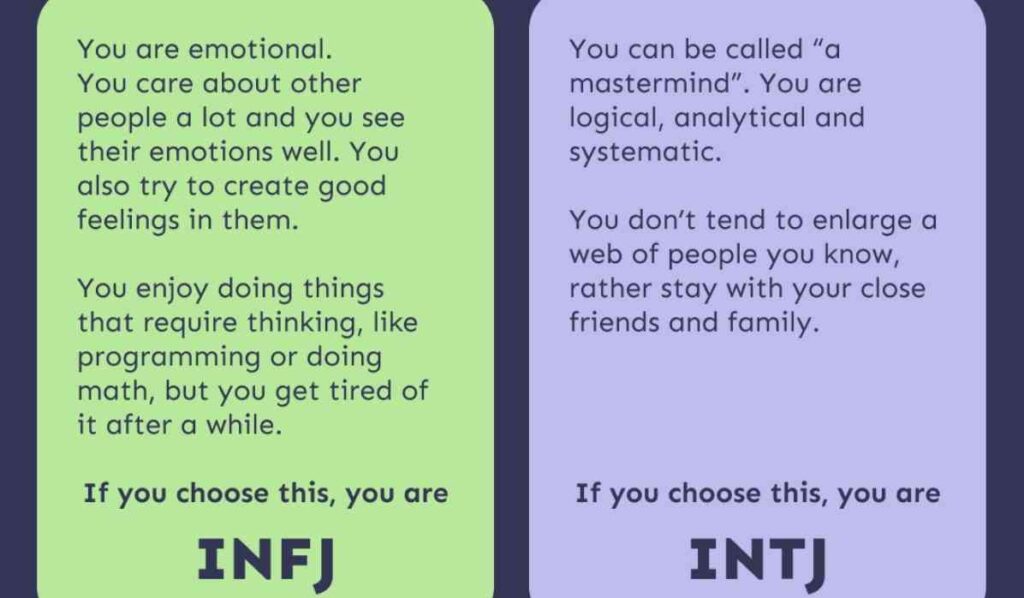The Main Differences Between INFJ and INTJ

The INFJ and INTJ are similar with regards to their ability for abstract thinking and exploring the deeper meaning and significance of what’s happening around and within themselves. But what about the differences between INFJ and INTJ?
They are forward-thinking and tend to make carefully planned decisions with a future goal or purpose in mind.
INFJ and INTJ both share a strong vision of what they want out of life and are compelled to invest in their future and embark on a meaningful and largely self-reliant path to success.
However, INFJs and INTJs differ in their auxiliary functions and this informs how they use their dominant introverted intuition.
We’ll not dive deeper into the main differences between these two personality types.
INTJ vs INFJ: How They Are Different

Due to their auxiliary extroverted thinking, INTJs are more concerned with intuiting about impersonal technical matters. They are more interested in working with systems and information that can be acted upon.
They like to leverage and devise technical strategies and methods for achieving their goals and objectives.
INFJs, by contrast, have extroverted feelings, which renders a more substantial interest in people and society than in technology and data systems.
They are curious about what makes themselves and others tick they are prone to psychoanalysis and the exercise of trying to figure people out.
They often try to empathize and put themselves in other people’s shoes in order to gain perspective about them and their motivations.
Despite their independently introverted nature, the INFJ is also disposed toward helping and catering to others’ needs and wishes. INFJs have a stronger interest in pleasing others than the intj.
Moreover, the INFJ can become a mirror of their environment, their empathetic nature often causes them to adopt and reflect back on the energy and feelings that others express
INTJs feeling function is introverted which means that relative to INFJs, they develop a more personalized set of moral values according to their own sensibilities.
This can make them unapologetically contrarian and less willing to sacrifice their personal values in order to oblige others.
With tertiary introverted feeling, INTJs consult their own feelings and draw their own conclusions when it comes to matters of moral and personal significance.
They are more inclined to give advice than to take it from others. However, INTJs generally recognize and support an individual’s right to make their own decisions and deal with the consequences.
INTJs prefer to keep emotion out of their decision process but may often feel the need to reflect and reassess what is and isn’t important for them. They need to prune away the things in their life that are draining their energy and happiness.
They are outwardly decisive and self-assured in their opinions and prefer to be direct but can sometimes come across as insensitive.
INFJs on the other hand are disposed towards diplomacy and tact in how they approach people.
The INFJ man or woman is ever cognizant of the effect their words and actions may have on others and use introverted thinking as opposed to the extroverted thinking that INTJs employ.
INFJs are more inclined to think critically about how and why things work. Their intellectual curiosity is often directed toward social and psychological areas.
INFJs find it rewarding when they can help people directly through acts of service teaching advice and friendship.
INFJs would like to perform the role of a sage who is valued for their insight perspective and counsel. Although INFJs harbor a sense of individuality, they also want to be a part of something bigger than themselves.
Community and group consensus are important to them and something they strive to preserve.
INFJs can feel they have a lesser grasp on why they do and feel certain things because they are so attuned to the feelings and attitudes of others.
They can easily lose sight of their own personal issues and burry themselves with the weight of other people’s emotional baggage as though it were INFJ’s burden to bear.
RELATED: Venus in Sagittarius: Meaning, Traits & Compatibility
Are INFJs Better Than INTJs?

Are we talking about making rational decisions and thinking independently without interference from emotions? Then INTJs are the winners.
But if we’re talking about being empathetic, sharing emotions effortlessly, and understanding how others feel in the blink of an eye? Then INFJs are the ones who come out on top.
INFJs are more comfortable with the language of feeling and emotion and are generally more effective than INTJs at reading people and identifying with them. They aim to understand, instruct, and inspire others.
INTJs for their part are more concerned about understanding and managing their own world. Their own proficiency is their priority and they can be impatient and critical of perceived incompetence in others.
They however also enjoy sharing information on matters in which they feel they wield intellectual authority.
INTJs tend to develop a firmer and more defined sense of who they are and what they want. INFJs, by contrast, find it harder to really sort out their own personal feelings although they are good at reading others.
RELATED: INFJ 4w3: Magnetic Visionaries
Who is More Introverted: INFJs or INTJs?
These two personality types are both introverts who enjoy going deep into everything: conversations, hobbies, passions, emotions, theories… But INFJs are more geared towards people and their own inner emotions.
On the other hand, INTJs know how to impose their will better and are not really concerned about others.
INFJs on the whole are inclined to display greater tolerance, empathy, and quiet warmth towards others.
They are active listeners who genuinely care about what people are thinking and feeling.
INFJs tend to feel a vested interest in the plight and problems of other people. They are keen on offering support and encouragement and attending to their emotional and physical well-being.
INTJs present themselves as more objectivistic and emotionally detached, although their emotions may show through in their face and behavior.
They differ from INFJs in that their personal feelings are more resistant to being influenced or affected by those of others.
Why do INTJs Like INFJs?
In a nutshell: they LOVE diving deep into anything. They just can’t get enough of it. INFJs are great listeners and come up with great and insightful questions. INTJs love sharing their ideas and knowledge, and are great teachers as well. They are perfect partners in crime.
RELATED: INFP 5w4: Personality Breakdown
Final Thoughts
These personalities are quite similar at glance. Both are intellectually active and love to work independently. They are internally focused, getting lost in their own ideas, hobbies, and emotions. But when you dig a bit deeper, you’ll find the differences.
INFJs are extremely empathetic and emotions run their life. INFJs are extremely logic and like to work with systems and structures.
INFJs are supportive listeners who can focus too much on other peoples’ needs, while INFJs don’t really care about others and tend to be more distant.
What’s Next?
How Does An INFJ Show Interest?
